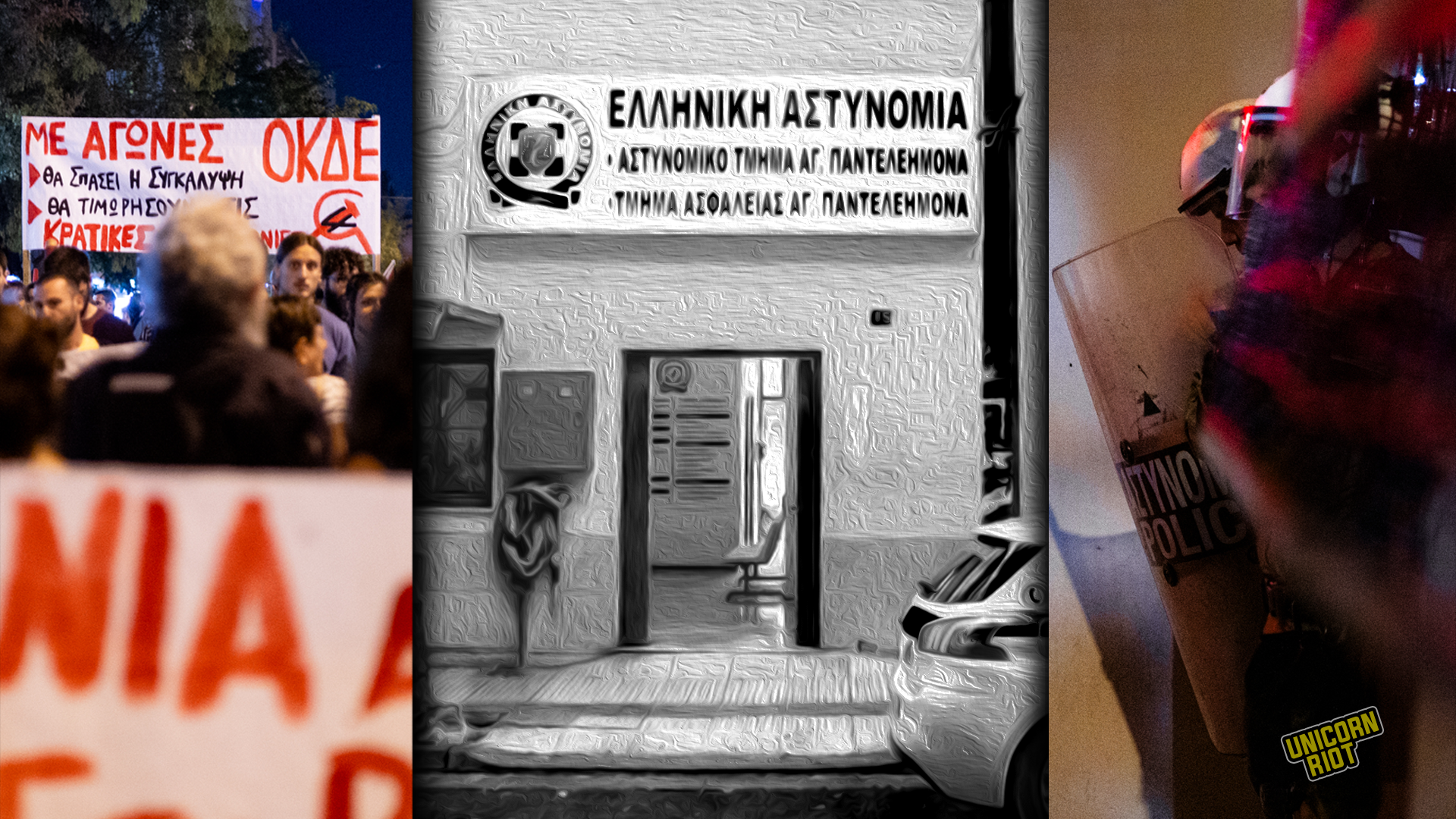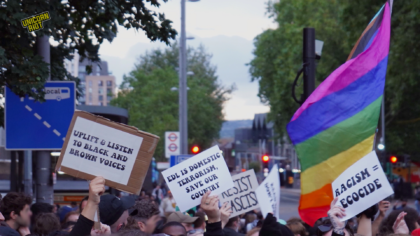Pakistani Immigrant With Signs of Torture Found Dead in a Greek Police Station
Athens, Greece – Muhammad Kamran Ashiq, a 38-year-old Pakistani immigrant, was found dead at the Agios Panteleimonas Police Station in central Athens, indicating another case of racist police brutality in Greece.
CONTENT ADVISORY: DESCRIPTIONS AND IMAGES OF TORTURE
Missing since September 13, Ashiq was found dead on September 21. Publicly released photographs revealed multiple abrasions and bruises on his body, strongly suggesting torture. According to his lawyer, Mrs. Spetsou, the injuries had been inflicted in a period between four hours and five days before his death. A report from an independent medical examiner is expected to clarify further the cause and timing of his injuries soon.
Documents released by the Ashiq family’s attorney show that Muhammad was first taken to the Omonia Police Station on September 13 and transferred to five other police stations before his death. He was also taken to the Evelpidon central courts of Athens, but was not allowed contact with any attorney or his family during his detention. This prolonged period of isolation adds more suspicion and uncertainty to the circumstances surrounding his death.
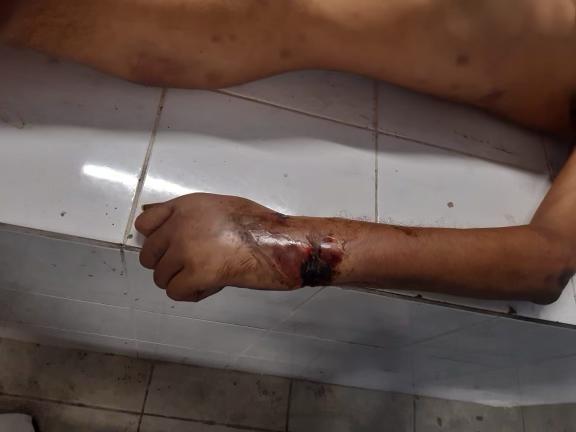

Muhammad had lived in Greece since 2005, spoke fluent Greek, had a residence permit since 2017, working legally and renting a house in his own name.
However, in stark contrast to these facts, the police report depicted Muhammad as a homeless drug addict who didn’t speak any Greek. Moreover, police claimed that he had supposedly already been beaten up by others before being detained at the Agios Panteleimon Police Station. The event report failed to mention the exact time, location, or reason for his detention, raising further questions about the transparency of the process.
Greek Police issued an official announcement on Thursday, September 26, several days after Muhammad’s death and on the day his death gained more publicity. The announcement concealed crucial details about the timing of his arrest and only acknowledged the case starting from September 18. The police repeated claims of substance/alcohol abuse and stated that his injuries were considered too minor to warrant hospital treatment when the ambulance arrived.
However, this version was contradicted by a press spokesperson for the National Centre for Immediate Assistance (EKAB), who stated that Ashiq had bruises on his head and the police department’s duty officer refused to allow him to be taken to the hospital.
The official police statement claims that Ashiq had damaged the bathroom in the police station, which led to his containment. It is noteworthy that both the bathroom and the temporary detention area, where Muhammad was found dead, were the only two places in the station without security cameras. According to the police, Ashiq had been moved to the temporary detention area following a minor altercation with other detainees. In response to the family’s concerns, their lawyer requested access to all available security camera footage from the police station.
Following Ashiq’s death, a preliminary investigation was launched by the prosecution authorities, with the Agios Panteleimon Police Station leading the inquiry. Given the station’s history of allegations of racist violence, torture, and corruption, the integrity of the investigation was immediately questioned by many.
On the evening of September 26, a march was held to protest police brutality and demand justice for Muhammad Kamran Ashiq. The crowd gathered to voice their outrage at the alleged cover-up of the events leading to his death and the broader issue of racist police violence in the area. The protest ended in violence when riot police (MAT) attacked the crowd with flashbang grenades and tear gas.
Protesters were beaten, and the motorized police unit (DRASI) outside Victoria Square also targeted civilians, further escalating tensions between the public and the police. Another protest took place the next night.
Scandals with Agios Panteleimonas Police Go Back Years
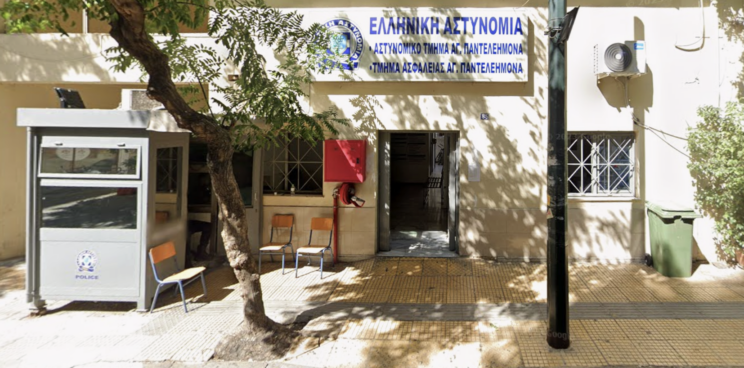
The Agios Panteleimonas Police Station, in particular, has a long and troubling history of accusations involving police violence, complicity with far-right groups like Golden Dawn, and a culture of cover-ups and corruption.
This incident is not the first time the station has come under scrutiny.
1) The Sarwari and others v. Greece case. Police officers in the Athens neighborhood of Agios Panteleimonas were accused of abusing Afghan refugees, including minors, in 2004. Although the officers were initially convicted, they were acquitted by the Court of Appeal in 2012. The case eventually reached the European Court of Human Rights (ECHR), which condemned Greece in 2019 for violations of Article 3 (prohibition of torture) and Article 6 (right to a fair trial), awarding 170,000 euros in damages to the victims. The ECHR criticized the lengthy delays in the legal process and the lack of investigation into the potential racist motives behind the abuse.
2) The role of police in Agios Panteleimon is tied to the rise of the far-right Golden Dawn party, which has operated as a paramilitary in the area. Since 2009, the police, in cooperation with local mafias and Golden Dawn, have been accused of “disciplining” migrants and workers through pogroms and beatings. The police department played a key role in enabling these activities, often turning a blind eye to or even actively collaborating with the fascist group’s operations. Golden Dawn operated under the guise of local residents’ committees, which allowed them to act as an unofficial arm of the Greek state, while the police provided cover or assistance. GD was labeled as a criminal organization in October 2020 and its leadership was imprisoned after a lengthy trial.
3) In September 2013, the former commander of the Agios Panteleimon police station, Thanasis Skaras, and Themis Skordeli, a prominent member of Golden Dawn, were arrested for involvement in smuggling, drug trafficking, and money laundering. Skaras faced numerous accusations of extortion, particularly from foreign shop owners, such as internet café and bar owners, whom he threatened with inspections for alleged irregularities. There were also reports that he accepted bribes and was involved in the smuggling of counterfeit goods. Despite these serious allegations, Skaras was acquitted of all charges in 2017.
In light of the Agios Panteleimon Police Station’s controversial history, the family of Muhammad Kamran Ashiq, along with The Unity, an organization of the Pakistani community in Greece and Movement United Against Racism and the Fascist Threat (KEERFA), released several joint statements. They questioned the police’s narrative, asking, “If the authorities admit that Muhammad Kamran only had one wound on his face when he was arrested, then who inflicted the endless wounds all over his body that led him to the grave?”
Timeline of Events According to Family & Supporters
The below timeline summarizes information given out by family attorney Maria Sfetsou, KEERFA and the Pakistani community of Greece at a press conference on Thursday, September 26:
- Sept. 13: Ashiq was arrested by police officers without the time and place being known and was taken to the Omonia Police Station for the crime of domestic violence and was detained under the self-initiated procedure.
- Sept. 14: Ashiq was transferred to the Evelpidon Court for trial. The case was adjourned until Sept. 16 and it was ordered to continue his detention until then, when he returned to the Homonoias Police Station.
- Sept. 16: Ashiq was again transferred to the Courts. The case was adjourned until December and his release was ordered.
- Instead of being released as ordered by the Court, he was transferred from the Omonia Police Station to the Patission Police Station at 8:25 a.m. in the framework of an administrative procedure to determine whether there were grounds for deportation.
- Ashiq was transferred to the Galatsiou Precinct because the Patission Precinct does not have detention facilities.
- Sept. 17: At 6:30 p.m., Ashiq was transferred to the Kolonou Police Station to continue his administrative detention there.
- At 11:00 p.m. he was released from Kolonou Police Station on the order of an officer of Patission Police Station, who was conducting the administrative investigation as Mohamed Akran Asik had all the necessary legal documents for his stay in the country.
- Sept. 18: A team of the Rapid Action Unit re-arrested Mohamed Akran Asik and transferred him to the Agios Panteleimonas Police Station at 12:30 a.m., that is one and a half hour after his release from the Kolonou Police Station.
- Ashiq was arrested inside the Agios Panteleimon police station for disturbing the operation of the service, damaging foreign property and disobedience, allegedly committed at that station. The above is also mentioned in the press release of the National Police.
- At 2:10 a.m. the ambulance arrived, as confirmed to The Press Project by sources of the ambulance.
- Ashiq was transferred to the Evelpidon Courts to stand trial for the above acts and was sentenced to four months in prison. He then returned to the Agios Panteleimon Police Station.
- Sept. 21: Muhammad Ashiq was found dead at 7:30 a.m. in the temporary detention room of Agios Panteleimonas.
Content Advisory: Images

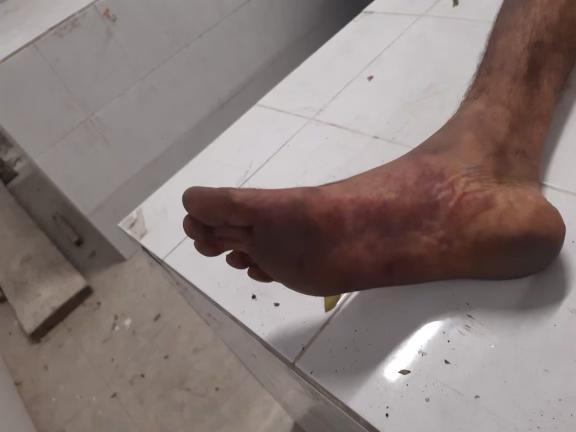
Ashiq’s family and advocacy groups vowed to continue their fight to bring justice for Muhammad and hold those responsible for his death inside the Agios Panteleimon Police Station accountable. The family departed in previous days to bury Ashiq in Pakistan. Upon their return, a big protest at the Agios Panteleimonas Police Station is being organized for Saturday, October 12.
For more from Greece, see our archives
Related:
Migrant Dies Amid Inhumane Conditions in Eleonas Refugee Camp [Sept. 2022]
Greece: The House of Women for Empowerment and Emancipation [Nov. 2017]
Cover image by Niko Georgiades for Unicorn Riot. Images contributed by Thanos Loukopoulos.
Follow us on X (aka Twitter), Facebook, YouTube, Vimeo, Instagram, Mastodon, Threads, BlueSky and Patreon.
Please consider a tax-deductible donation to help sustain our horizontally-organized, non-profit media organization:

